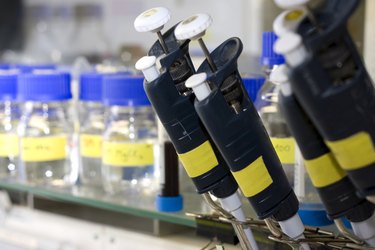
The digestive process transforms food into microscopic particles that nourish the body. Humans utilize two types of digestion -- mechanical, such as chewing, and chemical, using enzymes. Digestive juices hold these enzymes and are released by the pancreas, liver and small intestine. These enzymes are responsible for breaking food down to its most basic elements for absorption. Many different types of digestive enzymes are present in humans, each with its own function. Testing for digestive enzymes might single out a deficiency responsible for some uncomfortable side effects during digestion.
Step 1
Watch for signs and symptoms indicative of a digestive enzyme deficiency. Feelings of gas and bloating after a normal meal might signify a lack of enzymes to digest the food properly. Other symptoms of enzyme deficiency include abdominal cramping, bowel irregularities and food intolerance. Make a note of which foods seems to cause the most symptoms.
Video of the Day
Step 2
Try slowly enjoying your meals and chewing thoroughly. Discomfort after eating might be the result of eating too rapidly or not thoroughly chewing your food, which might lead to indigestion. Enzymes in saliva start digesting foods before they even leave your mouth -- take your time starting the digestive process and chew thoroughly.
Step 3
Complete a food challenge if no apparent food allergy -- which would likely produce swelling or hives -- exists. If the symptoms are purely gastrointestinal, such as bloating or gas with certain foods, remove these foods from the diet for a couple days. People who suspect a lactose intolerance can do this test safely at home. Re-introduce the dairy with a 14 oz. serving after abstinence. If the symptoms reappear within two hours of consuming the dairy, you could have a digestive deficiency of the enzyme lactase.
Step 4
Schedule a doctor's appointment for a formal screening. No do-it-yourself home enzyme kits exist -- you need a physician to obtain samples of saliva, blood or stool to test for enzymatic presence or absence. The physician can also check for underlying causes of a digestive enzyme deficiency, such as pancreatic or liver problems.
Video of the Day
Is this an emergency? If you are experiencing serious medical symptoms, please see the National Library of Medicine’s list of signs you need emergency medical attention or call 911.